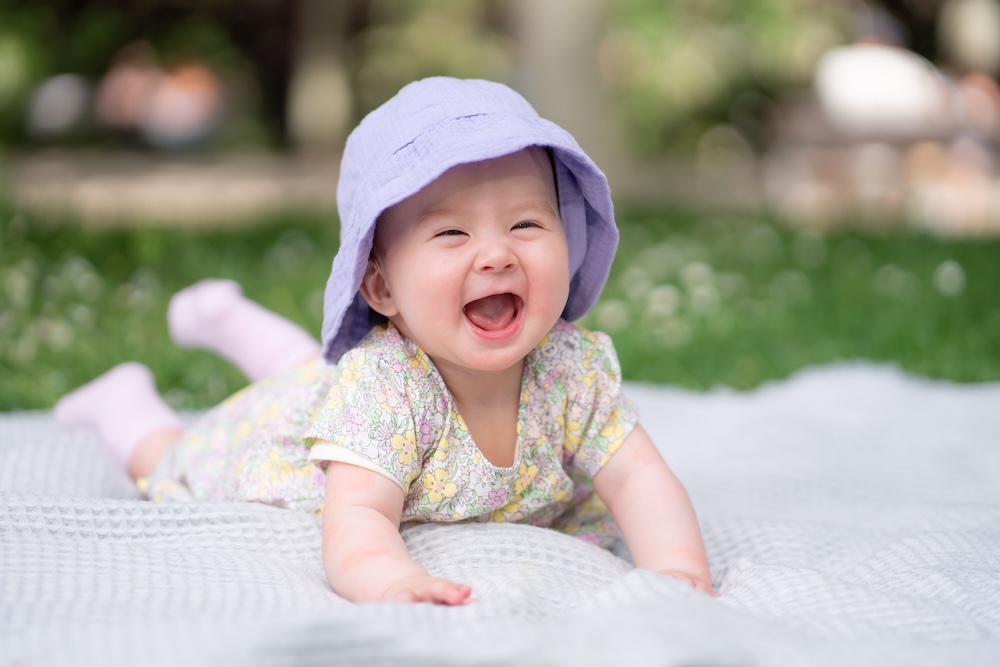Your baby’s first summer can feel exciting as you get to spend more time outdoors with them and enjoy the sunshine together. While summer is a fun season, it also comes with potential risks for babies. Infants are more sensitive to high temperatures and sun exposure because their bodies aren’t yet able to regulate temperature as effectively as adults. That’s why it’s important to take extra steps to keep your baby safe, cool, and comfortable throughout the warmer months.
Dress Your Baby for Hot Weather and Protect Them from the Sun
One of the best ways to keep your baby cool during the hot season is to dress them in light-colored, lightweight, and breathable clothing that covers most of their skin to also protect them from the sun. Be careful not to overdress them, however, as too much clothing can make your child feel overheated and uncomfortable. If your baby is sweating or acting fussy, that’s a sign that they’re feeling too hot. It’s also beneficial to give your baby a wide-brimmed hat to keep their head, face, and neck shaded.
Remember that babies under 6 months of age should be away from direct sunlight, as they have delicate skin that is more sensitive to the sun. When you go outside with your child, find shade under a tree or use an umbrella or the stroller canopy. Limit their sun exposure during the sun’s peak hours (between 10 am and 4 pm) as this is when the UV rays are strongest. It’s also important to apply broad-spectrum sunscreen 30 minutes before going outside (if your baby is over the age of 6 months) and reapply every 2 hours. Sunscreen should be used even on cloudy days and should have an SPF of at least 30. We recommend giving your baby sunglasses with at least 99% UV protection as well.
Keep Your Baby Hydrated
Babies are at greater risk of dehydration because their small bodies lose fluids more quickly. If your baby is under 6 months old, breast milk or formula provides all the hydration they need. It’s important to offer feeds more frequently during hot weather. If your baby is over 6 months old and is eating solids, you can offer 4-8 ounces of water per day in addition to breast milk or formula. Watch for signs of dehydration, such as fewer wet diapers, dry lips, fussiness, or unusual sleepiness. If you notice any of these signs, please call our pediatrician.
Protect Your Baby from Water
Water safety is also important to consider when keeping your baby safe during the summer. Babies should never be near water without adult supervision, even if the water is shallow. Just 1-2 inches of water can be dangerous for infants. If you have an inflatable or portable pool, empty it after every use and turn it upside down. If you have a regular pool, make sure it is fenced properly or covered when not in use. Babies should not be introduced to pools until they’re at least 6 months of age.
Protect Your Baby from Insect Bites
There are more insects around in the summer, especially in areas of vegetation. To prevent insect bites, you can use an insect repellent, but only if your baby is at least 2 months old. Make sure to use a repellent that comes in the form of a stick, lotion, or unpressurized spray. Pressurized spray can cause your infant to breathe in the repellent or get it in their eyes. Avoid applying the repellent on your baby’s hands in case your child puts their hands in their mouth. When you bring your baby back inside, wash the repellent off their skin with soap and water. If your baby is younger than 2 months, we recommend placing a net over their stroller or carrier to prevent bugs from getting inside.
Keep Indoor Spaces Cool
Babies should always be kept in a comfortable temperature at home. Overheating can increase the risk of Sudden Infant Death Syndrome (SIDS). The ideal temperature is between 68-72°F (20-22°C). We recommend using an air conditioner or fan to keep your home cool. Make sure your baby is also dressed in a single layer of light clothing only. If there are a lot of windows in your baby’s room, keep the curtains or blinds closed during the sun’s peak times, as the sunlight can increase the temperature of the room.
Lastly, keep a lookout for signs of heat illness and exhaustion, such as rapid breathing, flushed skin, restlessness, vomiting, or even becoming unusually quiet or unresponsive. If your baby shows any of these signs, move them to a cool area immediately and call our office. Remember, if you have questions or concerns about your baby’s health during the summer, our pediatrician is here to support you.




